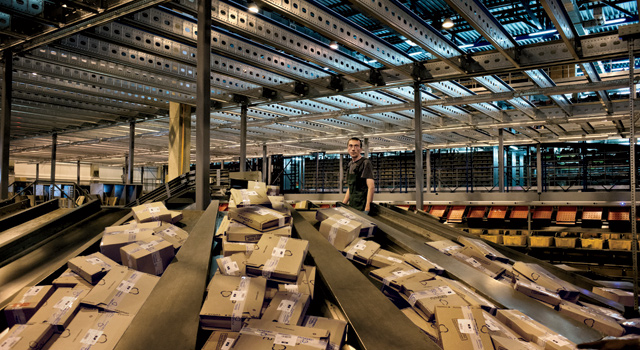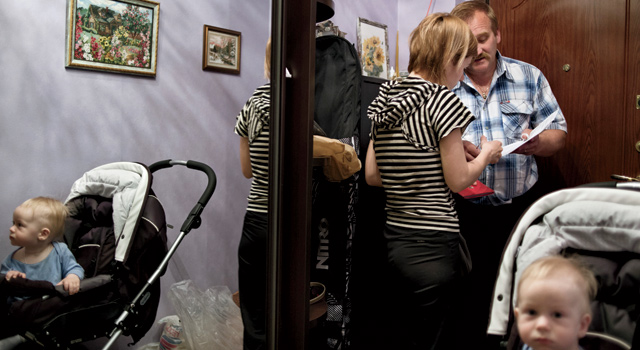August 21st, 2012
Courtesy of Fast Company, an interesting report on an ambitious e-commerce startup in the world’s last great untapped Internet market:
“We will have dinner,” Maelle Gavet says. “And you will see the girls.”
“The girls?” I ask.
“I told you I’d show you the nightlife of Moscow” is Gavet’s riddle of a reply. “I will show you the nightlife of Moscow.”
Gavet–CEO of Russia’s largest e-commerce company, Ozon Holdings, and the closest thing this country has to a Jeff Bezos–is taking me to Soho Rooms, one of the city’s hottest nightclubs, and then we’ll be off to a few more clubs. If we’re still upright by 8 a.m., we plan to check out a pretty cool after-hours spot she knows about. “Or you can go home if you get too tired,” she adds.
It’s 10 p.m. in Moscow on a sticky May night. The sun is just going down. And as Gavet’s driver–a stern-looking Russian man named Alexey–navigates a large, late-model Audi through the city’s famously clogged streets, all I can think is, I hate nightclubs. And: So this is how one’s kidneys get stolen.
The traffic subsides and Alexey speeds through the streets while Gavet continues to offer dry, evasive replies to my increasingly frantic questions about what she means by “the girls.” We pull up to the club, a converted warehouse overlooking the Moscow River, and next to the Bentleys, Benzes, and Ferraris that idle outside, our $80,000 Audi looks positively proletarian. I’m hit by a wave of temporary panic as we pass through “face control,” the draconian door policy that is standard practice in Russia. (“Arrive by car,” my guidebook suggests. “The bigger the better.”) Inside, we sip $15 mojitos, eat sushi, and watch as an endless line of pudgy, well-dressed men accompanied by absurdly beautiful women have their pictures taken by party photographers. Moscow is said to be home to 78 billionaires, more than any other city in the world, and on this particular night, they seem to have all converged on the same decadent club.
“If you have an idea here, chances are it hasn’t been done well,” Gavet says. “Russia is an amazing country to be an entrepreneur.”There are, as Gavet promised, girls: a seemingly endless procession of nymphic dancers in vaguely gothic costumes–leather underwear, beehive hairdos, blindfolds, body paint. I count 15 nearly naked women, gyrating on the club’s gilded ramparts above the flat-screen TVs that read “Soho is good for your image.” Around 2:30 a.m. there’s a laser light show and then a performance by somebody called DJ Zombie Boy.
Gavet barely seems to notice our ridiculous surroundings. I’ve been following her around for a week, watching her work nonstop, and even amid this den of distraction, she’s still at it. She stands alone, back against the wall, head slumped over a Nokia smartphone wrapped in a neon pink case. It may be 3 a.m., and Soho may be good for your image, but Gavet doesn’t care. Managing 1,500 employees at one of Russia’s booming Internet startups, as a 34-year-old French woman, in a country that has not historically been amenable to foreigners, women, or managers of any kind, is a constant struggle. She tells me that she loves nightclubs, but she doesn’t let her guard down and doesn’t appear to be enjoying herself. Gavet, the only woman here not trying in some way to please a man, may not be the only person doing business here, but she is the only person writing emails at this hour.
She looks up from her phone for a second, clinks her mojito to my beer, and says, “Welcome to Russia.” Then she’s back to work.
Think of this place as the web’s last frontier. Russia was ignored for most of the past decade by venture capitalists even as they poured money into the rest of the BRIC cohort–Brazil, India, and China. Conventional wisdom has said that Russia was too corrupt, too unpredictable, and too underdeveloped. That’s the country I imagined I’d find, one full of gangsters, oligarchs, and bad drivers. (The last I verified firsthand.)
The lack of credit-card penetration–the vast majority of purchases, including online ones, are made in cash–and the country’s poor infrastructure has made e-commerce particularly problematic. Most American retailers–including Amazon, eBay, and Walmart–have stayed away. “Could Russia potentially be the home of the next massive tech boom?” asked Matt Marshall, the editor of VentureBeat, in 2010. “The short answer is: No way. Not anytime soon.”
Gavet has succeeded by taking the other side of this bet. “It’s happening now,” she says. “E-commerce is at a tipping point.” She points to Russians’ soaring incomes: Per-capita purchasing power has tripled, to $19,000, since 2000. (Compare that with Brazil, where per-capita income is still under $12,000, despite a high-growth economy.) Russians are also enjoying a newfound embrace of the Internet. The country now boasts roughly 70 million Internet users, more than any other European country.
She can also point to Ozon’s soaring revenue. It booked $303 million in sales last year, almost doubling its total of $165 million in 2010, the year Gavet took over. Although it is often referred to as the Amazon.com of Russia, Ozon, which sells books, electronics, and all manner of household goods, is actually much more than that. Shipping packages here is something of a crapshoot–the only nationwide delivery network is the painfully slow Russian Post–so Gavet is building her own private shipping company, O-Courier. She’s also investing heavily in two new businesses, Ozon.travel, which sells airline tickets, and Sapato.ru, a Russian version of Zappos acquired by Ozon in February. The idea is to own not just the Amazon of Russia, but also the country’s Expedia, Zappos, and even its UPS. “We want to build the biggest online player in Russia,” Gavet says.
Although things are a lot better in Russia today than they were in the first flush of capitalism in the 1990s, this is still one of the most difficult places in the world to start a company. The roads are god-awful, the language is a bear for outsiders, and corruption remains endemic. The World Bank ranks the Russian Federation 120th in terms of ease of doing business–behind such free-market powerhouses as Egypt and Nicaragua. For all its progress, what Russia truly lacks is ambitious, entrepreneurial types who speak Russian and understand how to build a company on the scale of Google or Amazon. In short, there are very few people like Maelle Gavet.
For all the opportunity that Russia presents Gavet, she doesn’t seem particularly fond of the place. She has lived here, on and off, for the past 14 years. During that time, she has learned how to speak the language with only a slight French accent, and she has come to feel more comfortable in Moscow than she does in Paris, where she was born.
 The Ozon warehouse in Tver (100 miles from Moscow, on the road to St. Petersburg) is the largest e-commerce logistics center in Eastern Europe. It can serve up to 3.5 million items and processes an average of 30,000 orders a day. | Photo by Yuri Kozyrev
The Ozon warehouse in Tver (100 miles from Moscow, on the road to St. Petersburg) is the largest e-commerce logistics center in Eastern Europe. It can serve up to 3.5 million items and processes an average of 30,000 orders a day. | Photo by Yuri Kozyrev Ozon’s O-Courier delivery staff accepts cash on delivery 80% of the time. Drivers travel in plain clothes rather than branded uniforms for safety reasons. | Photo by Yuri Kozyrev
Ozon’s O-Courier delivery staff accepts cash on delivery 80% of the time. Drivers travel in plain clothes rather than branded uniforms for safety reasons. | Photo by Yuri KozyrevEven so, during the week I spent with her, Gavet complained continuously: about the roads, the traffic, the quality of air travel, the service at Russian restaurants, the food at Russian restaurants, and, of course, the paperwork. Getting most anything done here requires filling out a form in triplicate, including (I kid you not) checking into a hotel. At all times during the day, Gavet’s desk–a large dining-room table that serves both as a place to park her laptop and a conference room for meetings–has a several-inches-thick stack of papers that require her signature. “I try to sign them in between meetings because if I wait until the evening it’s so discouraging,” she says. Russian companies generally must carry an administrative staff that is two to three times larger than what would be normal in the West, just to deal with those stacks.
Many companies simply don’t bother following the rules, instead keeping their businesses off the books or simply paying off government officials as needed. Twenty-six percent of all Russians paid a bribe in 2010, according to Transparency International’s annual survey, compared with 5% in the U.S.
Gavet never fell in love with any of this; she fell into it. The daughter of a high-school librarian and a software engineer, she decided to study Russian after concluding it was the only way she’d be able to get into an elite college. “I had an argument with my German teacher, so I was like, Okay, I have to take Russian,” she says, smiling sheepishly. “I was probably horrible back then.” In the summer of 1998, using money she’d earned planning children’s birthday parties, she bought a plane ticket to Moscow and volunteered at an orphanage in a small town in the Kostroma Oblast province, four hours north of the capital.
The following year, she was accepted into France’s top university, l’Ecole Normale Superieure, and she returned triumphantly to the orphanage that summer. Her plan was to help out where she could, goof around, and speak a little Russian.
But then Gavet struck up a friendship with one of the orphanage’s backers, a businessman who had made a small fortune as an importer after the fall of the Soviet Union. If it sounds shady, that’s because it was. “The reason I don’t want to give you his name is that back then a lot of businesses weren’t fully white,” Gavet says. (In Russian business argot, “white” businesses are companies that operate entirely in the formal economy, pay their taxes, and submit to the tangle of regulations. The informal, or “black,” economy accounted for 46% of GNP in 1999.)
Let’s call Gavet’s friend “Ivan.” Over lunch at Ivan’s company cafeteria, Gavet pitched him on the idea of turning the dining room into a conference center for local businesses: “I said, ‘Your canteen sucks, and there is no event infrastructure around here. I can do a much better business. You just need to give me $50,000.’ “
So Ivan opened his briefcase, took out $50,000 in cash, and put it on the table. Just like that, the 20-year-old Parisian was co-owner of a Russian company, Predstavitelskij Dom. Gavet never told her parents about her business–students at ENS are technically considered French civil servants and receive a monthly salary, so she was financially independent–and for the next four years, she spent far more time in Russia than she did in class. She’d fly to Moscow after class on Monday night and stay in Russia through Saturday. “The goal wasn’t to create a billion-dollar company,” she admits. “The goal was to create something useful where I could learn things.”
Her original idea was only moderately successful–the demand for corporate events in small-town Russia was modest–so Gavet moved into corporate day care, opening the event space to the children of her clients’ employees for a fee. It soon became the most profitable part of a modest enterprise that at its height had revenue of $100,000 a year and 15 employees. It wasn’t much, but it covered Gavet’s travel expenses and gave her a taste of the Russian economy after more than 70 years of communism and 10 years of dysfunctional capitalism. “If you have an idea here, chances are it hasn’t been done well,” she says. “If you have drive and energy, everything is possible. This is an amazing country to be an entrepreneur.”
She stepped away from Predstavitelskij Dom after graduation and spent three months in the United States working with one of Ivan’s cronies. “He was an American citizen who I will not name either, because I’m not sure everything was fully clean,” she says. Once she’d learned English, she landed a job as an associate in the Paris office of the Boston Consulting Group in 2003. Her background, the recruiter told her, made her something of a gamble.
While Gavet found her calling as an undergrad working in Russia, Ozon struggled as an enterprise born amid the euphoria of the dotcom bubble. The company was founded in 1998 as an online bookstore. “Investors Pile Into Russian Internet,” blared an Agence France-Presse headline in 2000 when Ozon raised $3 million from Baring Vostock, a Moscow-based private-equity firm. At the time, the excitement about the Russian Internet was mostly hype: In 1999, only 1.5 million Russians, about 1% of the country’s population, were online. Ozon’s monthly sales were just $15,000–more than Gavet’s tiny events company, but not by much.
Ozon’s investors, who owned a controlling stake in the company by this point, had planned to raise additional capital and scale up quickly, but the market for investments in money-losing Internet companies evaporated in 2001, as it did worldwide. E-commerce startups require enormous investments to reach profitability: Amazon famously spent seven years and more than $2 billion before it found its way into the black. Ozon had roughly $10 million to work with. The company went through a series of CEOs and layoffs, and limped through the decade. “We were in survival mode,” says Bernard Lukey, who advised the company on behalf of Baring Vostock starting in 2000 and became CEO in 2005. “I was flying around the office, firing people.” Finally in 2007, Lukey raised $18 million in a round led by the Geneva-based Index Ventures, which has also backed Skype and Dropbox.
We were in survival mode,” says Bernard Lukey, Ozon’s CEO before he promoted Gavet. In the mid-2000s, “I was flying around the office, firing people.”The capital injection allowed Lukey to build Ozon its own warehouse and to begin adding new products–electronics, toys, and housewares–to books and DVDs. (Since its earliest days, Ozon has also done a brisk business in antiquarian items: rare books, 19th-century coins, and collectible stamps.) In 2009, Lukey hired Gavet, who’d been transferred to BCG’s Moscow office, to come up with a plan to expand Ozon’s product mix. It was a four-week project; two weeks after getting her assignment, Gavet met with Lukey and told him he’d asked the wrong question. Ozon didn’t need more products; it needed capital. “We said, ‘Here are the product categories,’ ” Gavet recalls. ” ‘But if you want to do that, you need more cash.’ “
At project’s end, Lukey offered Gavet a job as his head of marketing and customer relations. She’d never had a marketing job, but Lukey told her if she did well, she would be his successor. Gavet, who was one promotion away from becoming a partner at BCG, left the consultancy, joining the company in January 2010. “It was a surprising offer,” she says, noting that at the time she’d never managed more than 15 people, “but that’s what made me interested.”
In the months that followed, Gavet launched an ambitious overhaul of the marketing department, doubling its size. But she soon realized that aggressively marketing Ozon wasn’t going to be enough to grow the company. Russia lags well behind much of the world in e-commerce, with less than 2% of its retail sales recorded online, compared with 4% in China and 5% in the U.S. “We needed to educate customers about online purchases,” Gavet says. “That meant marketing but also building trust.”
In interviews with Russian reporters, Gavet emphasized Ozon’s reliability and the fact that it is a white, tax-paying company. She partnered with small local businesses to establish hundreds of new pickup points–storefront locations where rural customers can pick up and pay for their packages. Without the approval of Lukey or the board, she ordered the company’s call center to operate around the clock. “I knew I wouldn’t get authorization, so I was just like, ‘Oops, it’s done,’ ” she says. “The fact that you can talk to a human being 24/7 creates trust.”
Taking a page from Zappos, the Las Vegas-based online shoe seller, Gavet put Ozon’s telephone number on every one of its web pages. She also instituted a policy whereby all new employees spend three days working at the call center to help them understand the concerns of the average customer–another innovation pioneered by Zappos. “I read everything,” says Gavet, who keeps an eye on the leading e-commerce companies around the world–not only Amazon (which owns Zappos), but also Japan’s Rakuten, Argentina’s MercadoLibre, Brazil’s Submarino, and France’s Fnac. “All of these companies have so much to teach us.”
As CEO, Gavet’s first job was to go on the road pitching investors in Europe, Asia, and the U.S. “They didn’t know us,” she says. “Their first question was ‘How clean is the company?’ ” She opened the books, which have been audited by Deloitte for the past eight years, answered their questions, and three months later, closed a $100 million investment from a consortium that included Rakuten and Index Ventures. It was the largest venture-capital round in Russian Internet history.
Not every aspect of Ozon’s business can be adapted from other companies. Whereas Amazon has been pouring resources into e-books and streaming video, selling digital goods remains a dicey proposition in Russia. In late 2010, Ozon introduced a Kindle-like e-reader, the Ozon Galaxy, but sales have been sluggish. “The appetite isn’t really here yet,” Gavet says. E-books and digital music downloads are still fringe products, in part because customers need a credit card to buy them and in part because of rampant piracy.
How to Buy a Book in Vladivostok






1) Place order on ozon.ru. 2) Ozon’s customer-service center calls customer to confirm order. 3) Order gets sent to warehouse where it’s picked and packed. 4) Ozon dispatches its own O-Courier driver in an unmarked car to deliver the package. 5) O-Courier driver calls customer an hour before arriving to make sure he is available for payment and delivery. 6) Upon arrival, the O-Courier driver presents the package for inspection to the customer. 7) If accepted, the O-Courier driver takes cash (80% of transactions are cash) and using his government-mandated receipt printer, issues the receipt in front of the customer, as per Russian law.
illustrations by Peter SucheskiSo Gavet’s company remains almost entirely dependent on delivering physical goods in the world’s largest country. On the morning of my third day in Russia, I head to a small loading dock in the outskirts of Moscow to meet Antoly Krivenkov, an affable former taxi driver who now delivers packages for O-Courier, Ozon’s logistics subsidiary. Until Gavet joined the company, O-Courier only handled deliveries to Moscow and St. Petersburg, but Gavet has presided over an ambitious expansion, adding some 500 cities in Russia and Kazakhstan. O-Courier now ships packages for Ozon–as well as 70 other retailers–offering overnight delivery in Moscow and St. Petersburg and 10-day delivery anywhere else in Russia for the same price as the much slower Russian Post. “An American company can just call UPS and say, ‘I have my orders, you deal with them,’ ” Gavet says. “It’s so much more complex in Russia.”
This becomes clear as I watch Krivenkov–who is 50 years old with close-cropped red hair, a bushy mustache, and a sizable gut–get to work. He grabs a shopping cart, walks past a reinforced door that protects the money-counting room, and heads toward a counter to pick up his packages. A clerk hands him a stack of invoices and then begins filling his cart with boxes. As Krivenkov loads up, I ask his supervisor, Antonina Smyshlyaeva, whether Ozon provides him directions for his route. She points to her head. “They know it here,” she says. “They know all the tiny roads, all the shortcuts.”
Krivenkov’s job isn’t only to deliver packages; he’s also responsible for collecting payments. Whereas credit and debit cards are the norm in the developed world and even in many developing countries, Russians have resisted the innovation. Eighty percent of Ozon’s purchases are cash on delivery, and nonpayment is a chronic problem. Every day, Krivenkov must bring several packages back to the warehouse either because the customers aren’t home or because they simply changed their minds about the purchase. Ozon has tried to address this issue: Each customer who places an order on Ozon’s website generally receives two calls–one from the call center immediately after the order is placed and another from the courier an hour or so before it is delivered. This has not, however, eliminated the problem.
“Hello, Natalia, this is Ozon. Are you at home?” Krivenkov barks into his cell phone as we set off into another horrendous Moscow traffic jam in his black Opel compact. He holds the handset in his left hand and uses his right to shuffle through invoices, each of which has a customer’s phone number. He’s not wearing a seat belt, and neither hand is on the steering wheel.
“Don’t worry that I’m using a mobile,” Krivenkov assures me. “I have 30 years of driving experience.”
We spend a half-hour or so going in circles as Krivenkov, who typically delivers between 20 and 40 packages per day, dials numbers. It’s a slow process. Gavet has used a combination of creativity and hard work to try to ameliorate these problems. The company’s Moscow warehouse takes deliveries overnight to minimize traffic delays and to ensure that couriers can get their packages first thing in the morning. Gavet is also experimenting with foot couriers in particularly dense areas to speed things up even more. The result: Eighty percent of Ozon’s deliveries to Moscow are made within 24 hours, a startling achievement in a country where pretty much everything in life is subject to lengthy delay.
Finally, Natalia is ready, and Krivenkov heads toward her third-floor walk-up in a Khrushchev-era apartment block. Krivenkov knocks and presents her with a slender box containing two books. Once she has verified the contents, he opens a small purse and retrieves a receipt printer. (The printers are yet another quirk of Russian bureaucracy: Each machine must be licensed by the government, each courier must have his own, and the receipt must be printed in front of the customer.) He takes her money, has her sign an invoice, and hands her two receipts.
Rush-hour traffic dies down and things pick up. We hit an office park, delivering some more books, a camping tent, and an e-reader. Krivenkov gets paid in cash each time. At the end of the day, he’ll take the money–which can sometimes total $2,000 or more–back to the safe room in the warehouse. “I’ve never been robbed,” he says. “But, of course, I worry about it.” Per company policy, Krivenkov stores packages in the trunk or in the car’s backseat covered by large blankets. He carries nothing that would easily identify him as an Ozon courier. Safety concerns have kept Gavet from putting the Ozon logo on delivery vehicles or issuing uniforms, robbing her of one of the West’s easiest branding gambits.
Sometimes precautions aren’t enough. Several months earlier, a courier from another delivery company was shot and killed–something that has happened several times in the past few years. “I was scared he was one of ours,” Gavet says. “I called immediately, and then found out it was not us. I was like, ‘Great, fine.’ And then I moved on. It’s a reality.”
Anybody who spends more than a few minutes with Gavet will notice these flashes of toughness. At Ozon’s main warehouse, two hours north of Moscow in the city of Tver, she leads me into the building’s newly constructed conference room, which she hasn’t seen yet. It’s a formal-looking space with a horseshoe-shaped table, and I remark that it looks very official. “They obviously didn’t check it with me,” she says with exasperation. “I’m not a fan of such official things.” After I meet with several of her top execs, she asks, “Did anyone say anything bad? Who do I need to fire?” She isn’t smiling.
Most of the time, she seems reserved, even cold. Gavet is perfectly happy to criticize her employees, the Russian state, and pretty much everything else. But she becomes almost painfully careful when the conversation takes a personal turn. When I ask about her husband, a freelance computer programmer who has followed Gavet around the world for the past eight years, she lets me meet him, but only on the condition that I not disclose his name in the article.
I ask Gavet if she has cultivated this sheen intentionally. Russian culture is, after all, brimming with nationalism and machismo. Perhaps, as a foreign woman, she needs to be distant in order to succeed? “I never ask myself these questions,” she snaps, then pauses for a moment, as if catching herself. “I don’t know. I can be more cold than people would like me to be.”
Her demeanor, which is diametrically opposed to the cultivated charisma of most American CEOs, seems to play well in Russia. Lukey, the former Ozon CEO, told me that it was Gavet’s personality that convinced him to hire her. “You hear these stories about how Russians need a czar or someone with an iron fist,” says Lukey, who now heads European operations for Yandex, Russia’s Google. “It’s the same in business. As a manager, you need to be trusted and respected and feared.” When he promoted Gavet, the first thing he did was give her the giant beige Audi. She protested, but Lukey explained that in Russia, CEOs must embrace the trappings of authority. “Being nice–the Western way–doesn’t bring results,” he says. “Russians need to be pushed.”
Gavet emphatically concurs. “You need to push and push and push on a permanent basis.” And so she does. She keeps a custom-made poster with the words nothing worth doing is easy in giant blue letters hanging above her desk. “That’s the mantra I use when the team tells me something is too complicated,” she says. “People keep saying, ‘We need more prioritization.’ I say, ‘Guys, what you want is less work. And that is not going to happen.’ “
One of her first moves as CEO was to require that all employees work during the post-New Year’s holiday. Most companies take a two-week break. “I said, ‘No way are we going to do that,’ ” she says. “I forced them to work. Everybody was screaming–and we had record sales.” So far, Gavet’s approach has been effective. She expects annual revenue to surpass $1 billion within the next three years.
Growing that quickly will require increasing Ozon’s footprint in Russia’s hinterlands, where most goods are still sold in outdoor markets. To this end, Gavet plans to add another 2,000 pickup points by 2014, bringing the total to 4,000 and essentially covering every town in Russia.
Another potential source of growth: a service for other small businesses to sell, warehouse, and ship their goods, similar to Amazon’s e-commerce platform. Right now, Ozon is running a pilot program that includes some 100 independent sellers. The plan is to hire account managers, who will serve as coaches to Ozon’s small-business clients–ensuring that they fulfill orders promptly, pay their taxes, and don’t run afoul of the law. Gavet thinks she can ultimately recruit thousands of merchants to Ozon’s platform, and even rent them web-server space, just like Amazon does. “We have this unique infrastructure, but we need to scale it,” she says. “The more orders we get through the pipe, the cheaper and more efficient delivery becomes.”
The wild card in Gavet’s plan is the country itself. A half-century of compulsory education under communism produced literacy rates better than those in the United States along with an impressive cadre of scientists and engineers, but very few people who understand how to run a profit-making company. “The best way to learn how to become a good manager is to be well managed, and very few Russians have had that experience,” says Esther Dyson, a longtime angel investor and Russia observer who sits on Yandex’s board. “Most Russian managers don’t know how to develop people, how to motivate them, or how to get them to work together.”
In other words, Gavet–like most Russian CEOs trying to build a new business infrastructure for the country–faces a slog. “It’s tough,” she says. “Not because of the corruption, but because of the bureaucracy, because of the energy you need to push, because you don’t have enough qualified people.”
Only during my final hours in Moscow does Gavet seem to relax a little bit. Just before dawn, on Saturday morning, as we wait in line to get into a rooftop bar called Gypsy, Gavet’s husband confiscates her phone. She protests, but then hands it over. After we enter, she buys herself her second mojito of the night, and then stands quietly alone, sipping her drink and taking in the party. She doesn’t say anything. Just as we’re about to leave, Gavet, drink still in hand, announces that she’s not ready.
“I’m going to look around,” she says. She smiles–her first real smile all week–and disappears into the crowd.
The Russian Internet All-Stars
They may hail from Moscow, but these power players’ influence is being felt across Silicon Valley. –Skylar Bergl
INVESTING
DST Global
Name to know:
Yuri Milner, CEO
The Russian Internet entrepreneur (he helped build Mail.ru, the Russian web portal) is best known for his savvy private investments in Facebook, Groupon, Path, Spotify, Twitter, Zynga, and the most recent Y Combinator graduates.
DISCOUNTS
Biglion
Name to know:
Oleg Savtsov, development director
Russia’s biggest coupon site may be a Groupon clone, but with $140 million in annual revenue and rapid growth, Biglion is surpassing Groupon’s performance in Russia.
SEARCH
Yandex
Name to know:
Arkady Volozh, CEO
The Google of Russia commands 60% of all Russian search traffic. Although its share price on Nasdaq halved in its first year since going public in June 2011, its market cap still hovers around $6 billion.
TRAVEL
Oktogo
Name to know:
Marina Kolesnik, CEO
Kolesnik went to Harvard and launched websites in the U.K. and the U.S. before doing it in Russia, where she founded Mail.ru as well as Oktogo, which offers more than 2,500 Russian hotels and apartments as well as 140,000 hotels in 160 countries. It’s poised to grow further with Russia hosting the 2014 Winter Olympics in Sochi.
SECURITY
Kaspersky Lab
Name to know: Eugene Kaspersky, CEO
It’s one of the top-10 antivirus software companies in the world, and Kaspersky himself has become the most prominent voice on such issues as global cyberattacks like Stuxnet.
GAMING
ZeptoLab
Names to know:
Semyon and Efim Voinov, cofounders; Misha Lyalin, CEO
The lean, 19-employee company created global gaming sensation Cut the Rope, which has been downloaded more than 100 million times on iPhones and Android devices. Much like Finland’s Angry Birds, the puzzle game’s star monster, Om Nom, is now being turned into toys and comics.
CLOUD COMPUTING
Nginx
Name to know:
Igor Sysoev, founder
Nginx (pronounced, engine-x) hosts about 12% of all the websites in the world, including 24% of the top 1,000. Notable customers include GitHub, Hulu, Whitepages, and WordPress.
MEDIA
SUP Media
Name to know:
Annelies van den Belt, CEO
The go-to blog platform in Russia also owns San Francisco-based LiveJournal, serving a monthly global audience of more than 50 million. Its advertising arm, +SOL, sells online inventory for the BBC, Last.fm, and Yahoo.
Focusing primarily on The New Seven Sisters - the largely state owned petroleum companies from the emerging world that have become key players in the oil & gas industry as identified by Carola Hoyos, Chief Energy Correspondent for The Financial Times - but spanning other nascent opportunities around the globe that may hold potential in the years ahead, Wildcats & Black Sheep is a place for the adventurous to contemplate & evaluate the emerging markets of tomorrow.








